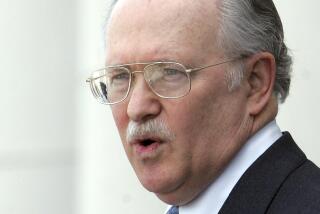An ‘evangelical seat’?
AFTER PRESIDENT BUSH acknowledged that Harriet E. Miers’ religious beliefs were among the reasons he nominated her to the Supreme Court, White House spokesman Scott McClellan reassured reporters that the nominee’s faith would play no role in her decision-making on the bench.
Understandably, liberal groups do not buy it. They fear that, if confirmed, Miers’ evangelical Christian faith would dictate her rulings. In particular, they are concerned that the president’s acknowledgment of his nominee’s evangelism was his way of signaling her opposition to a constitutional right to an abortion as established in Roe vs. Wade. They view religious affiliation solely as a proxy for ideology.
There is no reason to doubt that the White House was indeed trying to shore up its nominee’s street cred as a reliable conservative by noting her religion, but something else may also be at play. Among white Americans for whom the memory of a distant homeland has long faded, religious affiliation often represents more than a private faith. It is a social identity akin to an ethnicity. A generation ago, Christian evangelicals were largely viewed as part of the broader white Protestant majority; today, they increasingly identify and organize themselves as a minority group.
In other words, in addition to cronyism, Bush’s choice of Miers is a classic example of constituency politics, which has long played a role in the Supreme Court selection process. In the 19th century, presidents sought to staff the court with regional diversity in mind. In the 20th century, ethnicity and, later, race played an increasingly important role.
Since Woodrow Wilson appointed Louis Brandeis in 1916, there has been a tacit understanding that a “Jewish seat” exists on the court. In 1956, when President Eisenhower appointed William J. Brennan, he did so in part to reinstate the “Catholic seat” on the eve of an election. In 1991, when Thurgood Marshall retired, President George H.W. Bush considered it politically astute to keep a “black seat” on the court.
Given this tradition, there is nothing surprising about the White House wanting to place a Christian evangelical on the court. Much like Catholics, Jews and African Americans, evangelical voters presumably want to see someone with whom they can identify appointed to the court.
But just as Miers’ religious affiliation should not by itself be an impediment to her appointment, it can’t assure her nomination. The need to appease a constituency should never override the need to appraise the appointee. The real question is whether Harriet Miers, the individual, is up to the job.
More to Read
Get the L.A. Times Politics newsletter
Deeply reported insights into legislation, politics and policy from Sacramento, Washington and beyond. In your inbox three times per week.
You may occasionally receive promotional content from the Los Angeles Times.










